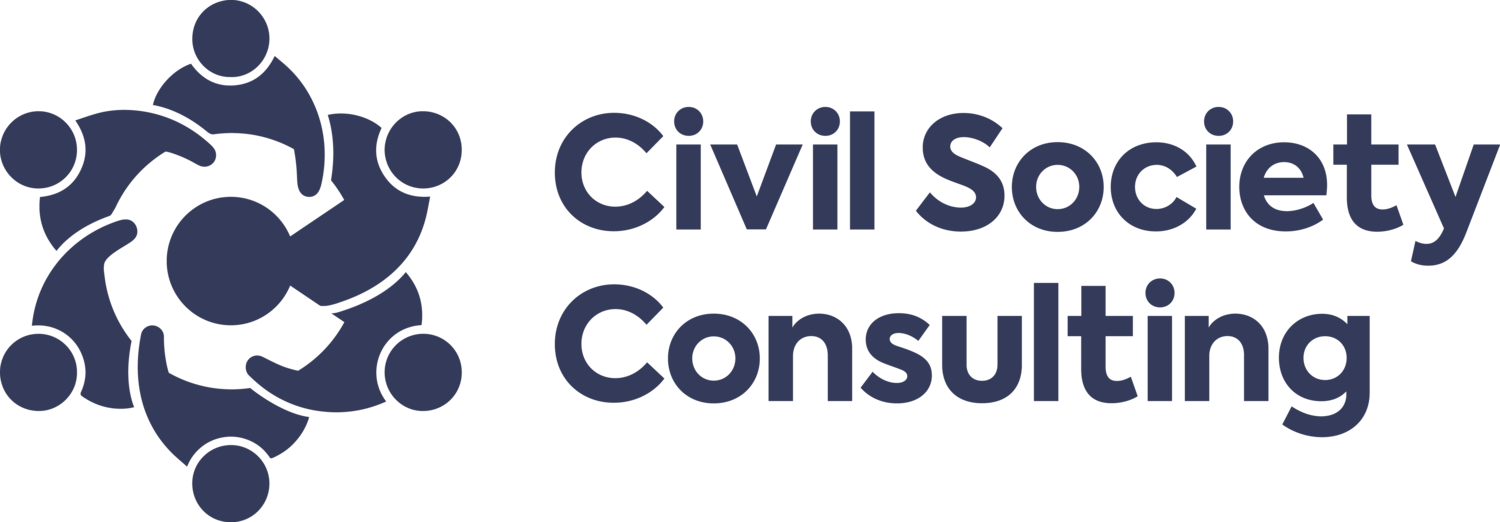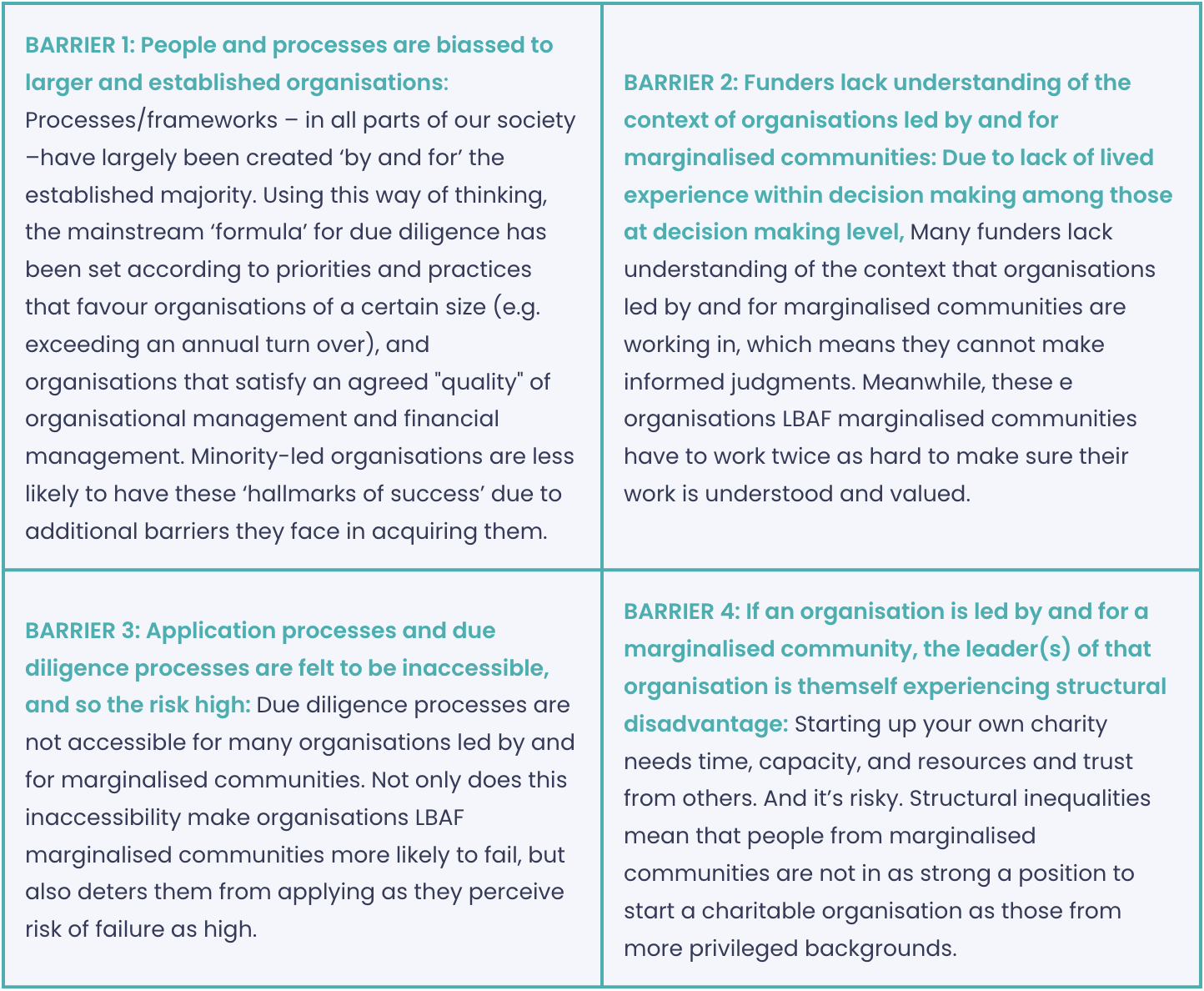NEWS: The four barriers to funding for minority-led organisations: Directors Natasha and Francesca reflect the recent research we conducted for NPC
Photo from AlchemyArt
Summary
In Autumn last year, New Philanthropy Capital (NPC) commissioned Civil Society Consulting to research the opportunities and challenges for making grantmaking processes - and in particular due diligence - more equitable and inclusive to organisations led by and for marginalised communities.
Through interviews and iterative discussions with funders, infrastructure organisations and grassroots organisations, we identified four main barriers that current due diligence processes pose for these organisations, which were then used to develop a series of practical recommendations for grantmakers.
In light of our findings, we are more convinced than ever that capacity building support, alongside small but significant adjustments to grantmaking processes, are the solution. As a tried and tested, cost-effective way of developing grassroots organisations, we want to offer up our Steps to Sustainability programme to funders as practical way forward.
If you are interested in making your grantmaking processes more equitable and inclusive, by providing ‘grants plus’ or by making changes to your grantmaking processes, we encourage you to reach out for a chat (book a call here).
Following the challenging year that was 2022, we at Civil Society Consulting (CSC) have firm belief that civil society – and in particular grassroots organisations led by those with lived experience of the community they’re supporting – have a vital role to play in supporting people and communities. We believe for civil society to be its most effective, it needs to be more representative of the people that need it most. Therefore the sector needs to be equitable and inclusive to organisations led by and for the most vulnerable communities in society.
We’ve been working towards this goal for 11 years, but especially since our relaunch as CSC in 2020. Through our flagship initiative - Steps to Sustainability (S2S) - we have provided free capacity-building support to over 100 minority-led grassroots organisations. Funded by the National Lottery, S2S is all about providing hands-on support and ‘learning by doing’ - we work with organisations on a one-to-one basis, co-producing key outputs with them, whilst coaching and upskilling them. You can look at some of our outputs here.
Through delivering S2S, we experienced first-hand how grassroots organisations led by and for marginalised communities are unrivalled in providing effective support to underserved communities. However, these same organisations are chronically under-resourced due to additional barriers they face in getting funding. Not only is this unjust, it is an efficiency.
Therefore we were thrilled when NPC - a think tank and consultancy - commissioned us to explore how grantmaking can be made more inclusive and equitable - as well as to improve its own approaches to Diversity Equity Inclusion and to provide thought-leadership on this sector-wide challenge. (Hats off to NPC for commissioning this valuable piece of research and thank you for choosing us!)
Our research methodology
We carried out participatory and iterative research, with 11 funders, six infrastructure organisations, nine grassroots organisations led by and for marginalised communities, and 14 NPC staff members - conducting a series of one-to-one interviews, roundtable discussions and workshops.
Our research focused on the due diligence aspect of grantmaking processes, which NPC have previously identified as the biggest ‘hurdle’ within the grantmaking process where organisations led by and for marginalised communities typically fall.
The four barriers
As we saw it when interpreting all our data, there are four main barriers that minority-led grassroots organisations face to passing due diligence and accessing funding. These align with our observations from almost three years delivering S2S, thanks to UK Government and National Lottery Funding.
What can funders do to mitigate these barriers?
Under each barrier we explored the opportunities for mitigating/reducing the barrier - and/or supporting organisations to overcome it.
Photo from the Lantern Initiative, a S2S organisation
For example, an opportunity to mitigate Barrier 1 (funder’s bias to larger, more established organisations) would be toreconceptualise the concept of risk. Due diligence is frequently framed around managing financial risk, which favours large, developed organisations. However, there is potential to develop a more balanced conceptualisation of risk if we place more weight on the risks of failing to fund organisations that need and deserve the resource.
Regarding barrier 2 (the challenges that funders have in understanding the context in which minority-led organisations are working) - we encourage funders to embrace new forms of decision-making. For example participatory approaches carried out by intermediary grantmakers with expertise, lived experience and/or passion for advocating on behalf of marginalised communities (e.g. LGBT+ Consortium’s Equity Fund). Where embracing new forms of decision-making are not possible, diversifying internal decision-making panels to incorporate different lived and learnt experiences is the ‘next best thing.’ Even when the panel doesn’t exactly match the lived experiences of the communities in question, diverse panels are likely to be more reflexive. We were also struck that by simply creating more opportunities for grant officers to interact with grantees and potential grantees can also go a long way to build funders’ understanding.
With a better understanding of where minority-led organisations are coming from, funders will be in a better position to make due diligence processes to be more accessible, which we identified as a third barrier.). Several opportunities were identified for funders to make the application process more accessible. Whilst some minority-led organisations viewed due diligence as a ‘test’, others saw it as a learning experience which would ultimately make their organisation more robust. Funders should capitalise on organisations’ willingness to learn by providing tailored support to organisations throughout the process, focusing on the co-production of outputs, building skills and confidence in the process. In this way, due diligence can be reconceptualised as a more inclusive experience for all involved. Additionally, funders could develop more inclusive communications by stripping back instructions and creating more visual and interactive application forms that reduces demand on the applicant. Face-to-face support also supports organisations to develop a more confident understanding of what is required and what to prioritise, but also helps them to be and to feel understood.
The surest way to address Barrier 4 – the structural disadvantage experienced by those leading minority-led organisations – is a commitment developing their capacity so they are able to exist in the sector on a level playing field with other organisations. A solution which cropped up and perhaps would see more immediate results would be ringfencing funds for marginalised communities and/or exercising positive discrimination. However it was seen as more sustainable and long-termist to provide substantial and robust capacity-building support to LBAF organisations facilitating them to not only thrive organisationally but take up space in the sector and participate in agenda setting and decision making, with a long-term goal of redistributing power. The emphasis on the impact and potential of capacity-building – through funding plus programmes and/ or use of embedded consultants – was encouraging for the CSC team, since this is exactly what our S2S programme is successful in doing.
Consider piloting Steps to Sustainability - which can be delivered flexibly under your banner
Photo from Ubuntu Multicultural Centre, a S2S organisation
S2S is a capacity-building programme with a difference - it exists to facilitate learning by doing (which is the best way to learn!). The support trusts organisational leaders to set the agenda on what they want they want to learn and produce. Additionally, we recognise that organisations also don’t tend to lack skills per se, more the mental blueprint and impetus for carrying out key activities.
Through S2S, we work in a one-to-one relational way, providing hands-on support to co-produce up to five tangible outputs (e.g. an impact report, a new website) over a 12 week period, whilst coaching and upskilling them on how to do so. Not only is learning-by-doing a more effective way to upskill, but organisations come out with tangible outputs at the end. Whereas organisations that have benefited from training-oriented capacity-building report struggling to action their learnings, S2S participants get the ‘mental blueprint’ for producing particular outputs, as well as the skills. Having identified priorities themselves and led the process, the organisations also come away more confident and energised.
We believe S2S is a ‘win-win’ solution – for funders who want to play a part in fostering a thriving, diverse sector, and for organisations who want to build capacity/resilience as well as achieve some short-term wins.
In conclusion…
If you’re a funder and you’re interested in how S2S could help you to fund and develop organisations led by and for marginalised communities, get in touch. See the slide-deck below for a more detailed summary of our pitch.
If you’re interested in the full analysis of this research, NPC will be publishing the full report soon. Follow them on social media - and/or us on Twitter and LinkedIn, where we’ll be re-sharing it when it’s out. Or get in touch (natasha@civilsocietyconsulting.co.uk) if you’d like to be directly notified via email when it’s published.
Again, we thank and salute NPC for the opportunity to support them with this vital piece of research.





